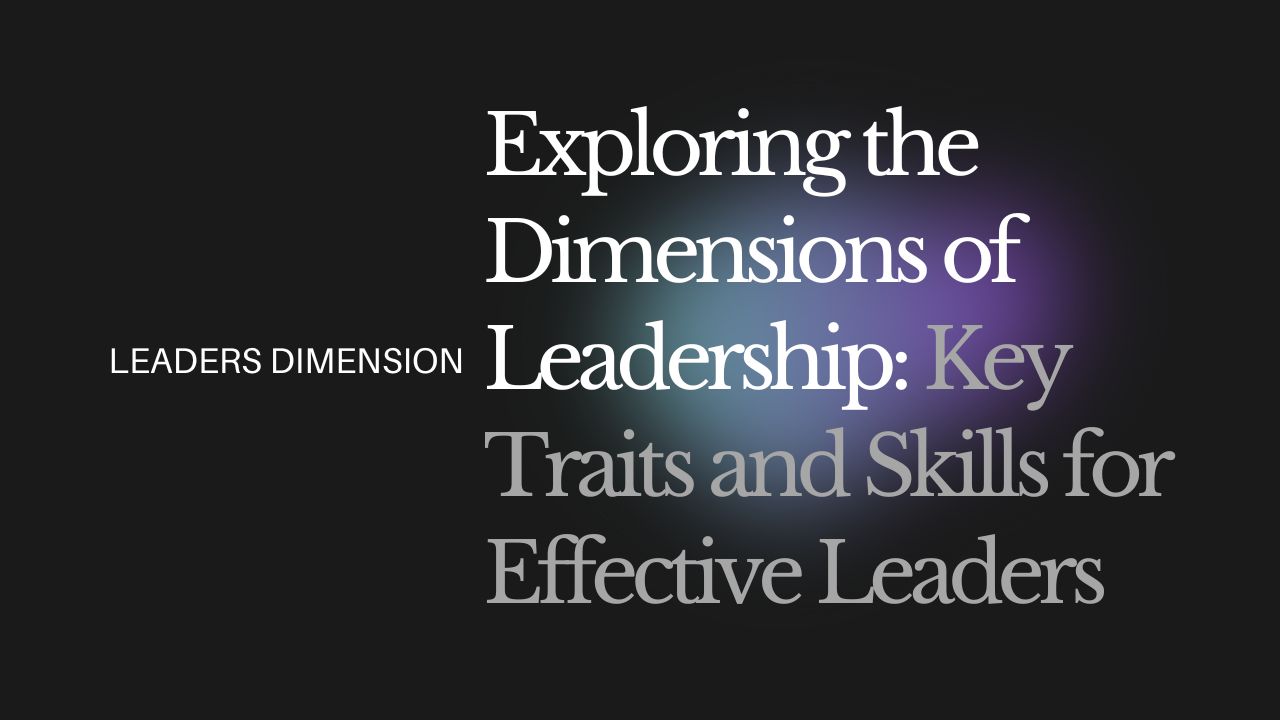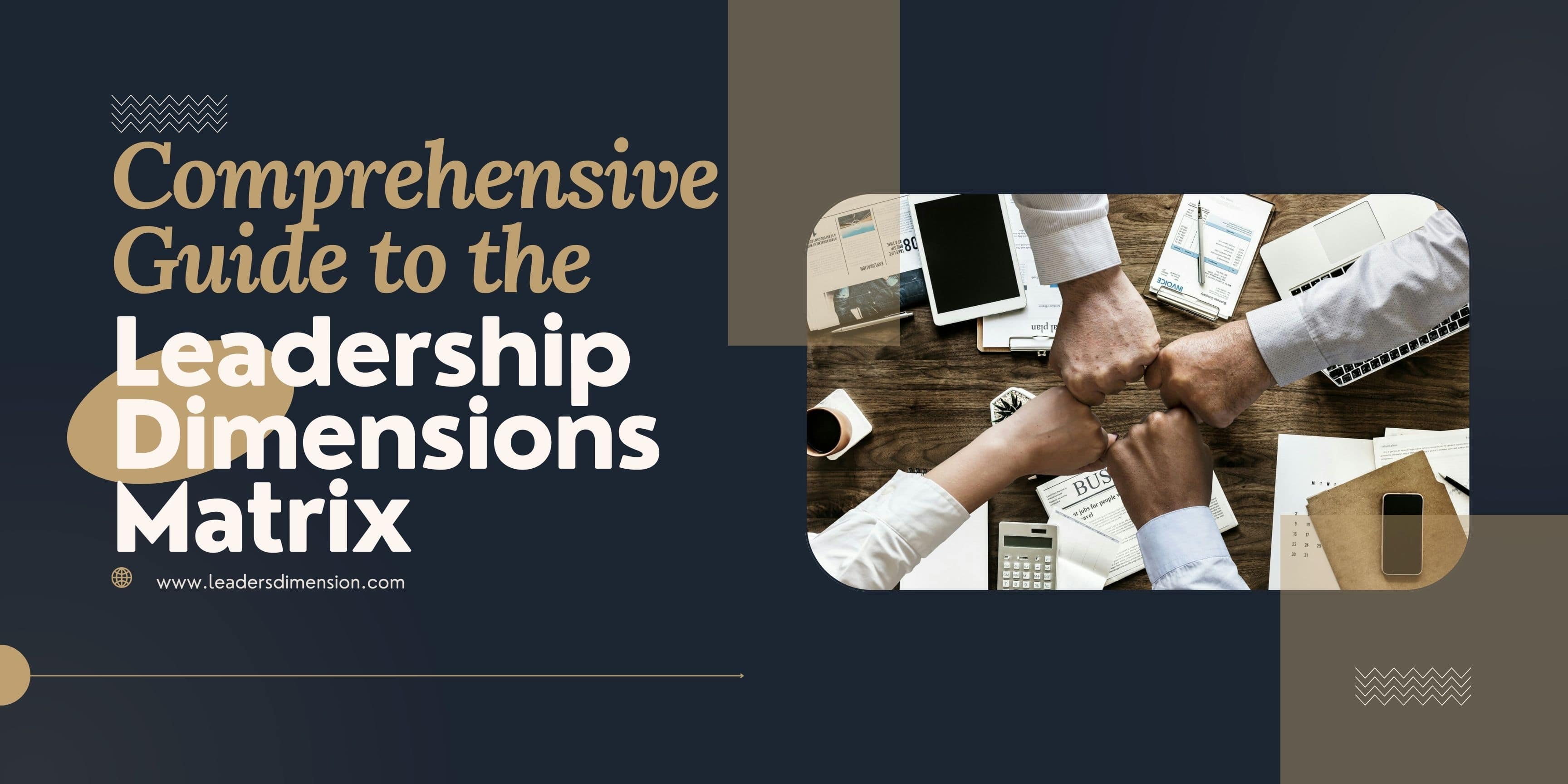Exploring the Dimensions of Leadership: Key Traits and Skills for Effective Leaders
Leadership is a multifaceted concept that extends beyond just guiding or managing a team. It encompasses a range of attributes, behaviors, and skills that enable individuals to inspire and influence others towards achieving a common goal. In this article, we delve into the core dimensions of leadership, exploring the critical traits and skills that characterize effective leaders and provide a roadmap for aspiring leaders to follow.
1. Vision and Strategic Thinking
Visionary Leadership: A leader with a compelling vision can articulate a clear and inspiring picture of the future. This vision acts as a roadmap, guiding the organization or team towards long-term goals. Visionary leaders are adept at forecasting trends, understanding market dynamics, and setting a strategic direction that aligns with the organization's values and objectives.
Strategic Thinking: Strategic thinking involves the ability to analyze complex situations, identify opportunities and threats, and devise actionable plans. Leaders who excel in strategic thinking are able to anticipate challenges, allocate resources efficiently, and make informed decisions that drive the organization forward.
Developing Vision and Strategy:
Engage in continuous learning about industry trends and market shifts.
Encourage open dialogue and brainstorming sessions within your team to gather diverse perspectives.
Regularly revisit and refine your strategic plans to adapt to changing circumstances.
2. Communication and Influence
Effective Communication: Communication is the cornerstone of leadership. Leaders must convey their vision, expectations, and feedback clearly and convincingly. Effective communication involves active listening, empathy, and the ability to tailor messages to different audiences.
Influence and Persuasion: Leaders often need to persuade stakeholders, motivate team members, and negotiate with partners. Influence is about building trust and credibility, while persuasion requires presenting arguments compellingly and aligning them with the interests of others.
Enhancing Communication and Influence:
Practice active listening to understand and address the concerns of your team.
Develop your public speaking skills and confidence in presenting ideas.
Build relationships based on trust and integrity to strengthen your influence.
3. Emotional Intelligence
Self-Awareness: Understanding one’s own emotions, strengths, and weaknesses is crucial for effective leadership. Self-aware leaders can manage their reactions and remain composed under pressure.
Empathy: Empathy allows leaders to connect with their team on a deeper level, fostering a supportive and inclusive work environment. It involves recognizing and addressing the emotions and needs of others.
Social Skills: Socially adept leaders can navigate complex interpersonal dynamics, resolve conflicts, and build cohesive teams.
Building Emotional Intelligence:
Reflect on your emotional responses and seek feedback to enhance self-awareness.
Practice empathy by actively listening and showing genuine concern for your team members.
Engage in team-building activities to strengthen social bonds and communication.
4. Adaptability and Resilience
Adaptability: In today’s fast-paced world, leaders must be agile and open to change. Adaptable leaders can pivot strategies, embrace new technologies, and respond to unexpected challenges effectively.
Resilience: Resilience is the capacity to recover from setbacks and maintain a positive outlook. Resilient leaders inspire confidence and perseverance in their teams, even in the face of adversity.
Cultivating Adaptability and Resilience:
Stay open-minded and willing to learn from new experiences and perspectives.
Develop a growth mindset that views challenges as opportunities for development.
Build a support network that can provide guidance and encouragement during tough times.
5. Decision-Making and Problem-Solving
Decisiveness: Effective leaders are capable of making timely and well-informed decisions. This requires gathering relevant information, weighing alternatives, and taking responsibility for the outcomes.
Problem-Solving: Leaders often encounter complex problems that require creative and logical solutions. Strong problem-solving skills involve analyzing issues, identifying root causes, and implementing effective solutions.
Enhancing Decision-Making and Problem-Solving:
Develop a systematic approach to decision-making that includes evaluating risks and benefits.
Foster a culture of innovation and encourage your team to contribute ideas for solving problems.
Learn from past decisions to refine your problem-solving techniques.
6. Integrity and Ethical Judgment
Integrity: Integrity is the foundation of trust and credibility. Leaders with integrity adhere to ethical principles, act with honesty, and demonstrate consistency between their words and actions.
Ethical Judgment: Ethical leaders consider the broader impact of their decisions on all stakeholders, including employees, customers, and the community. They strive to balance short-term gains with long-term sustainability.
Strengthening Integrity and Ethical Judgment:
Establish and uphold clear ethical standards within your organization.
Lead by example, showing commitment to honesty and transparency.
Engage in regular ethical training and discussions to stay informed about best practices.
7. Collaboration and Team Building
Collaborative Leadership: Collaboration involves working effectively with others to achieve common goals. Collaborative leaders foster a culture of teamwork, where diverse talents and perspectives are valued and integrated.
Team Building: Building a strong team requires selecting the right people, developing their skills, and creating an environment where they can thrive. Effective team building promotes trust, cohesion, and high performance.
Fostering Collaboration and Team Building:
Encourage open communication and collaboration across all levels of the organization.
Recognize and celebrate team achievements to build a sense of camaraderie.
Provide opportunities for professional development and team-building activities.
8. Innovation and Creativity
Innovative Leadership: Leaders who embrace innovation are willing to take risks and explore new ideas. They create a culture where creativity is encouraged, and failure is seen as a learning opportunity.
Creativity: Creativity involves thinking outside the box to find novel solutions to problems. Creative leaders inspire their teams to challenge the status quo and pursue continuous improvement.
Encouraging Innovation and Creativity:
Allocate resources and time for research and development initiatives.
Foster an environment where experimentation and new ideas are welcomed.
Recognize and reward innovative thinking and solutions.
9. Mentorship and Development
Mentorship: Effective leaders serve as mentors, guiding and supporting their team members' professional growth. Mentorship involves sharing knowledge, providing feedback, and helping others navigate their career paths.
Development: Leaders committed to development invest in the growth and well-being of their team. This includes offering training opportunities, encouraging continuous learning, and supporting career advancement.
Promoting Mentorship and Development:
Establish mentorship programs that pair experienced leaders with emerging talents.
Provide regular feedback and career development discussions with your team.
Encourage a culture of learning by supporting ongoing education and skill-building.
10. Accountability and Ownership
Accountability: Leaders who hold themselves and their teams accountable for their actions and results create a culture of responsibility and high performance. Accountability involves setting clear expectations and following through on commitments.
Ownership: Taking ownership means being fully committed to the success of the organization and willing to take initiative. Leaders who demonstrate ownership inspire their teams to do the same.
Instilling Accountability and Ownership:
Set clear goals and expectations for performance and behavior.
Encourage a culture where team members feel responsible for their work and outcomes.
Recognize and reward individuals who consistently demonstrate accountability and ownership.
The dimensions of leadership outlined above provide a comprehensive framework for understanding what makes a leader effective. By developing these key traits and skills, leaders can enhance their ability to inspire, influence, and drive their organizations toward success. Whether you are an aspiring leader or an experienced executive, focusing on these dimensions can help you navigate the complexities of leadership and achieve your goals.
Develop your leadership dimensions and elevate your impact!
- 21 June 2024






